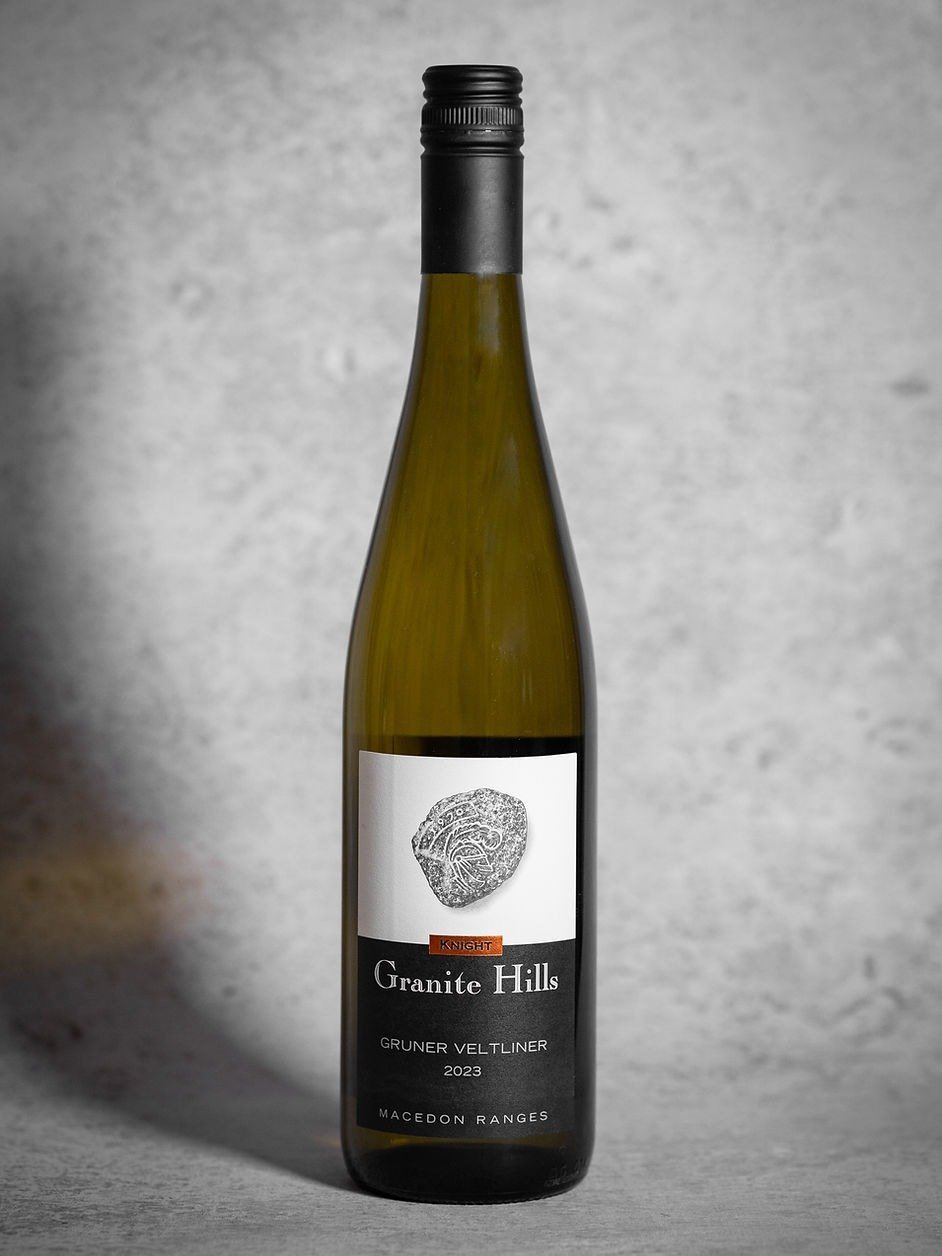Granite Hills
Macedon Ranges, Victoria
Gordon and Heather Knight established Granite Hills in 1970, one of the seminal vineyards in the Macedon Ranges at the time. To say they were pioneers is no hyperbole. Granite Hills boasts one of Australia’s highest and most picturesque sites – the 12-hectare vineyard is perched high atop the North-east facing part of Victoria’s Great Dividing Range, at 550-metres above sea level.
Their Rieslings have amassed hundreds of accolades for their superb quality and amazing ageing potential. This explains Granite Hills’ timelessness and relevance. Today, their son Llew carries on the family tradition of crafting distinctive award-winning cool-climate wines from a site that has at once been mystifying and challenging to work over the years.
While Riesling rules here, it’s the broad range of aspects this site offers that gives Llew the chance to grow an extensive range of varieties – noble French ones thrive here, along with more recent additions, like Pinot Blanc, Grüner Veltliner and Gamay. The wind-shielded north-northwest sites home the red varieties, while the southern sites see the white varieties flourish. This truly idyllic location provides the best growing conditions, combined with old granitic sandy loam soils with good drainage, for the 50+ year-old vines (the oldest in the region!).
Of course, winemaking only aims to channel the fruit’s vitality, with gentle and slow handling to preserve its natural qualities, and through a traditional, fool-proof maturation process. These wines express the Macedon Ranges’ granitic influence through and through.
2023 Riesling
High altitude and cool night temperatures impart unmatched purity of aroma, flavour and natural acidity to the fruit from their 50-year-old vines. The Granite Hills Riesling (formerly known as the Knight Granite Hills Riesling) is an enduring classic that stands proudly in a long lineage of pioneering wines.
Winemaking:
Hand harvesting and hyper protective, gentle winemaking techniques, including airbag pressing and pure stainless steel fermentation, nurture the fruit’s qualities and craft a style renowned for its pristine varietal expression and fine natural acidity, which gives the wine the ability to age and gain even greater complexity with time.
Tasting Notes:
Bright floral and minerally driven nose. Pear and apple flavours on a dry light bodied, but nicely intense palate.
2023 Gruner Veltliner
Llew chose Grüner Veltliner for its intriguing qualities and viticultural link with Riesling. The variety’s renowned success in the cool, and granite soils of homeland Austria made it a perfect contender. This is a gastronomic wine gifted with hearty aromatics of stone fruit and a fresh spicy finish. Just 400 dozen are produced every year. This is easily one of the greatest examples of new-world Grüner Veltliner made in Australia and likely Macedon Ranges’ ONLY Grüner Veltliner.
Winemaking:
Llew counteracted Grüner Veltliner’s natural herbacious characters with some barrel fermentation, to encourage aeration of the juice and build complexity.
Tasting Notes:
The wine is showing its parentage to Savagnin, Gewurtztraminer and Sauvignon Blanc, with tropical notes filling the nose along with crunchy green apple and pear characters. Intense notes of ginger and white pepper stand out on the nose and linger on the palate.
2023 Pinot Blanc
The inspiration to plant a small section of Pinot Blanc came from its affinity for granite soils and cool climates. Famously grown in places like Alsace, which Llew believes shares characteristics with Macedon in terms of terroir, he thought it wise to graft it over a small section of Riesling 8 years ago. It grows in the cooler southwest bank of the vineyard. Llew also picks it to achieve a soft touch of acidity. Long, slow cool ferments allow for the Nashi pear character to balance out those honey suckle characters and green apple characters. This Pinot Blanc showcases the versatility of Macedon and one Llew feels is integral to the range.
Winemaking:
Llew chose to plant Alsatian clone 54 and Italian clone VCRS. This is a delicate style Pinot Blanc, more refined than its Alsatian counterpart, since it’s not blended with other varieties, allowing the variety to shine on its own. The fruit was hand harvested and the juice was partly (20%) fermented in barrel, which added to the mid-palate, and stainless steel fermented with moderate lees stirring. Less than 300 dozen is produced each year on average.
Tasting Notes:
It has intense aromas and flavours of pear and honeysuckle, complemented by some melon and musk characters, acidity (5.6g) showing great intensity yet balanced by fruit sweetness (only 0.2g of residual sugar) and a generous mid-palate with almond meal texture and flavour. The granitic influence shows through the wine’s stark definition and precision.
2023 Gamay Noir
The fruit grows on the north western end of the vineyard, which is also the steepest section. Gamay’s hardy nature makes it ideal for this challenging environment. Llew emphasised that 2023 produced a sleeker, brighter style, compared to the more tannic, bolder Gamays produced in previous years.
Winemaking:
The berries are entirely destemmed and allowed to ferment naturally across five barrels, 1 new and 4 old (about 12 months). The wine is fashioned according to cool-climate Swiss examples Llew has experimented with. Clones include 222m 15, RCV12 and BWG19. Less than 200 dozen are made each year. For the first time, a third of the fruit went through carbonic maceration.
Tasting Notes:
It has an iridescent medium ruby colour and an inviting bouquet of blackberry, cherry and sweet spice characters. The palate is juicy and fruit-driven. It has fine, glossy tannins and a lively acidity.
2022 Pinot Noir
This estate-grown Pinot Noir is produced each year using fruit from the southern end of the block, the cooler north slope and the warmer east-west section. Clones include MV6, 777, 115, D5V12 and 114.
Winemaking:
Some whole bunches are included, but mainly whole berries are used, as Llew believes the combination of the three sites means that whole bunches are not required to build structure. Stems don’t tend to lignify as well in this cool climate. Llew favours light pre-soaking and daily plunges to keep the skins submerged. The wine spends 12 months in French oak barrels, 25% new. Hand-picked on the 8th of April 2022.
Tasting Notes:
This is a very elegant Pinot Noir that shows great varietal expression - blackberry, sour cherry and a hint of sweet spice. It has fine, ripe tannins and a very elegant, well-integrated acid line that runs far.
2017 MCC
This wine is a classic Right Bank Bordeaux blend of Merlot (57%), Cabernet Sauvignon (28%) and Cabernet Franc (15%). The fruit grows in lighter granite soil profile.
Winemaking:
It’s matured in the cool of their cellar in French oak barrels for 36 months. It has an alluring nose of red fruit and oak, with a juicy smooth palate complete with well structured yet soft tannin.
Tasting Notes:
Plums, blackberry and red cherry characters fill the nose and the palate, balanced with elegant, spicy tannins and bright acidity that lifts the finish. So finely boned yet densely fruited it has incredible appeal.
2017 THE GORDON
Affectionately named after Gordon who planted the Cabernet vines, which are now the oldest in the region, this wine is an ode to his passion for Bordeaux varieties. All three varieties grow in the middle of the vineyard situated along the north east slope.
Winemaking:
This wine is a blend of Cabernet Sauvignon (60%), Cabernet Franc (30%) Merlot (10%) made from hand harvested grapes grown on low-cropping 50-year-old vines, utilising small pot fermentation, followed by maturation in French and American oak barrels for three years. The wine always gets held for at least five years before release to build complexity.
Tasting Notes:
This wine leads with the fragrance of Cabernet Franc followed by the blackcurrant fruit and bramble of Cabernet Sauvignon and warm cedary oak. The palate is softly textured, with berry fruit and cocoa flavours, finishing with smooth mature tannins.
2018 Shiraz
From the first vintage in 1978, the Granite Hills Shiraz has set a benchmark for white peppery Shiraz, renowned for its definitive flavour, balance, structure and ability to age gracefully.
Winemaking:
The vines sit at the warmer south-south western end of the block, near our friends at Cobaw Ridge. Made in a Northern Rhone Syrah style, Gordon planted the variety not only for its popularity, but also its affinity with the granite soil present in the area. The grapes are fully destemmed and the juice is fermented in open fermenters, and hand plunged. The wine spends two years on barrels, 90% French (10% new) and 10% American oak.
Tasting Notes:
The palate is rich, mouth filling, well balanced and complete with classic white pepper, blueberry, and blackberry fruit characters. It finishes long, with a final grip of fine tannins and persistent black and blue fruit flavours.
















